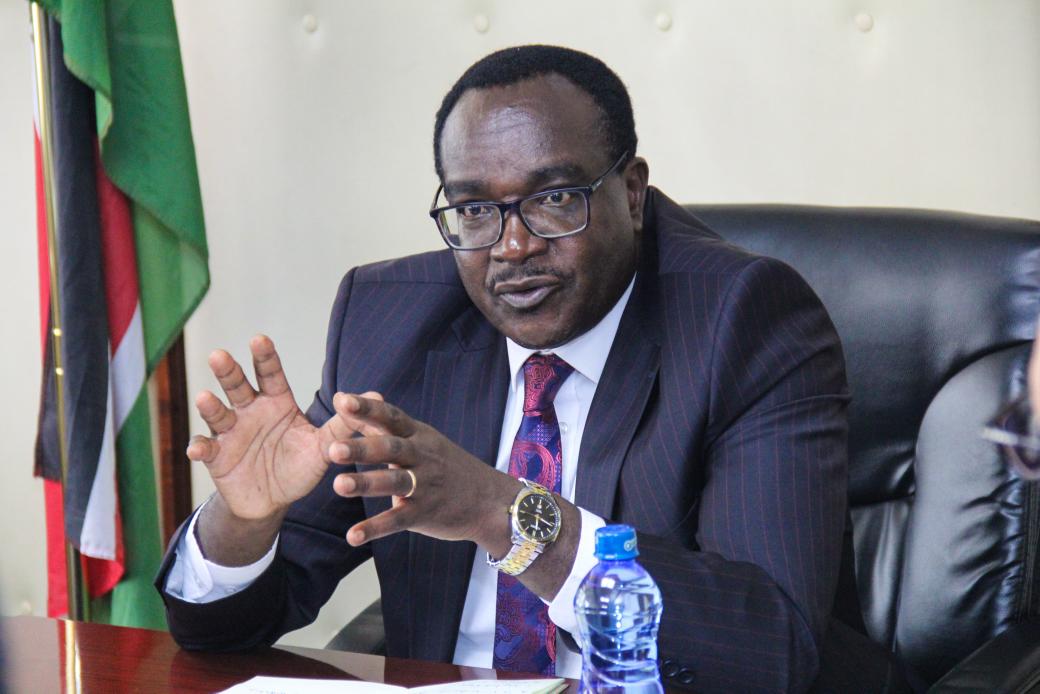
 Education CS Julius Ogamba
Education CS Julius OgambaOverall, the number of candidates who sat the exam increased by 7.19 per cent, from 903,260 in 2023 to 962,512 this year.
Of these, 246,391 attained the minimum entry grade of C+ and above, representing an increase of 45,258 learners compared to 201,133 candidates who attained the grade in the 2023 KCSE exam.
Some 49.41 per cent of candidates who sat the 2024 KCSE exam scored the minimum entry grade C- or above and qualified for diploma-level training.
The number of candidates attaining minimum university entry grade has been rising steadily over the years, with the 2022 cohort producing 173, 345 candidates.
The government has since 2016 been automatically financing the education of all candidates who qualify to join universities and TVETs through loans.
A new funding model introduced in May 2023—one that sought to ensure only those who apply for loans are sponsored—hit the headwinds after the High Court declared it unconstitutional and discriminatory.
It sought to allocate loans and sponsorships to students across five bands based on their families’ financial muscle, with those from vulnerable households receiving up to 95 per cent support.
Those from able families would finance up to 70 per cent of their university education, freeing up substantial amounts of money that would support their less fortunate counterparts.
But Justice Chacha Mwita sitting at the Milimani High Court ruled on December 20, 2024, that this amounted to discrimination.
“The government has a constitutional responsibility to fund public universities. Passing this burden onto parents is a violation of the Constitution,” he said.
He further observed that the changes in the funding model did not adhere to the necessary legal provisions in its creation, including undergoing sufficient public participation.
The annulment of the model, coupled with the requirement for the government to allocate more resources for technical and vocational education and training (TVET), means the situation could be dire.
Education CS Julius Ogamba acknowledged that there was going to be a challenge as a result of the court ruling but assured learners that no one would miss out on sponsorship.
Anxiety was building up among students in their second, third, and fourth years over the likelihood of dropping out over a lack of funding.
But speaking on January 14, Ogamba allayed the fears, saying the government would release funding to cater for the fees and upkeep of students across all higher education institutions as it works to align university funding with the court's ruling.
He said this was because the funds had already been allocated in the 2024–25 budget.
"The government will release funding to universities based on the new university funding model even as it seeks ways to address the issues raised by the court because the money is already in the budget,'' Ogamba said.
In the budget read on June 13, 2024, the government allocated Sh656.6 billion for education in the current financial year, accounting for the lion’s share of the Sh4.2 trillion budget.
Higher Education Loans Board (HELB) and other scholarships received Sh62.8 billion.
As part of cutting spending and freeing up resources for the most critical expenditure, the Cabinet on Tuesday approved a number of austerity measures, which saw some 42 state corporations merged into 20 while some 35 others were earmarked to be either divested or dissolved.
Topping the list of the 42 state corporations proposed to be merged into 20 entities was the University Fund and the Higher Education Loans Board (HELB).
The Cabinet did not, however, list which state corporations related to university education with duplicating, overlapping or related mandates were merged into the two.
While chairing the meeting at State Lodge, Kakamega, President William Ruto said the move was in line with government's commitment to streamline government operations, reduce wastage and curb excesses.
“All professional organisations currently categorised as state corporations will also be declassified and will no longer receive government budgetary allocations,” the Cabinet resolved.
The Cabinet noted that many state corporations have been struggling to meet their contractual and statutory obligations, leading to an accumulation of pending bills amounting to Sh94.4 billion as of March 31, 2024.
The austerity measures could be a way the government seeks to save funds as the new cohort of university students waits to join their respective institutions in September.


